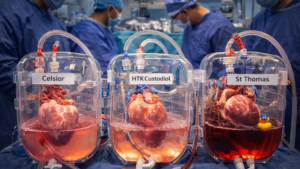The use of intraoperative mechanical support during lung transplantation has traditionally been a controversial topic. Trends for intraoperative mechanical support strategies swing like a pendulum. Historically, cardiopulmonary bypass (CPB) was the modality of choice during transplantation. It provides full hemodynamic support including oxygenation and decarboxylation. Surgical exposure is improved by permitting the drainage of the heart and provides more permissive retraction. CPBs contain drainage reservoirs with hand-held pump suction catheters promoting blood conservation through collection and re-circulation. But CPB has its disadvantages. It is known to cause systemic inflammation and coagulopathy. CPB requires high doses of heparinization, which increases bleeding risks. As transplantation progressed, off-pump transplantation began to trend as a preferable option. ECMO, however, has many of the benefits of CPB with less of the risk. Outcomes were improved with ECMO compared to CPB. CPB has a higher blood transfusion requirement, a higher need for post-operative ECMO support, a higher re-intubation rate, high rates of kidney injury and need for hemodialysis, longer ICU stays, higher incidences of PGD grade 3, as well as overall in-hospital mortality when compared with ECMO use. The focus now shifts to using intraoperative mechanical support to protect the graft, helping to reduce ischemia-reperfusion injury and allowing for lung protective ventilator settings. Studies show that the routine use of ECMO during transplantation decreases the rate of primary graft dysfunction and many adverse outcomes including ventilator time, need for tracheostomy, renal failure, post-operative ECMO requirements, and others. As intraoperative planned ECMO is considered a safe and effective approach, with improved survival and better overall outcomes compared to both unplanned ECMO implementation and off-pump transplantation, its routine use should be taken into consideration as standard protocol.
Keywords: complications; double-lung transplant; extracorporeal membranous oxygenation; ischemia-reperfusion injury; pulmonary hypertension; rejection; single-lung transplant.







